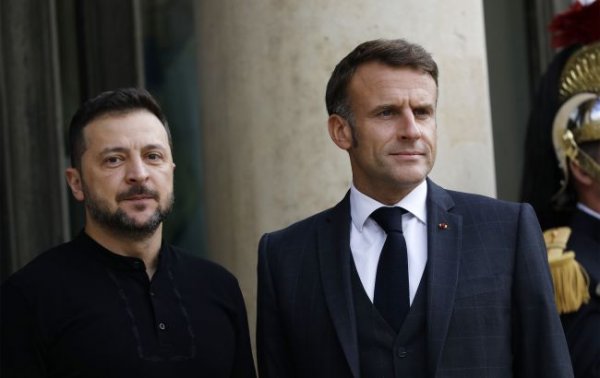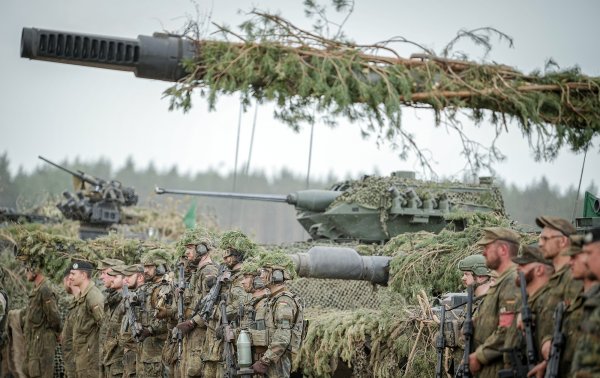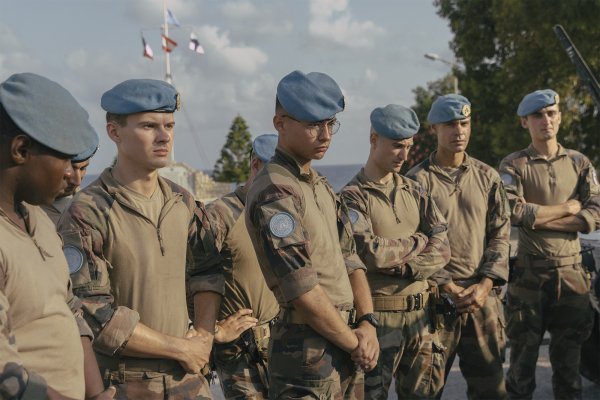
Volodymyr Zelensky and Emmanuel Macron (photo: Getty Images) Author: Roman Kot
Emmanuel Macron is holding a summit in Paris of countries that could send their troops to Ukraine. Whether his long-standing initiative will become concrete and how Europe can support Ukraine now – in the material of RBC-Ukraine journalist Roman Kot.
Content
- Foreign troops in Ukraine – will there be specifics?
- Uncertainty factors
- Why is the UN peacekeeping mission being discussed again?
- Support for Ukraine here and now
Today, March 27, a summit of the “Coalition of the Willing” to support Ukraine will be held in Paris. Representatives of more than 20 countries have been invited, including the European Union, as well as Great Britain, Canada, Norway and Turkey. Ukrainian President Volodymyr Zelensky will also attend.
Foreign troops in Ukraine – will there be specifics?
The goal of the meeting in Paris is to cement Europe's status as an influential and, most importantly, independent player in the international arena. It received a public “slap in the face” in mid-February, at the Munich Security Conference. Then the American participants, led by Vice President J.D. Vance, publicly stated that European leaders would not be at the negotiating table to end Russia's war against Ukraine. And they made it clear that Europe's security is primarily Europe's business, so it will no longer be possible to blindly rely on the United States, as before.
These events have brought at least some of the EU leaders to their senses. Therefore, decisions are being made quickly, by EU standards, to increase defense spending. And at the level of individual states, France and Great Britain are trying to unite a “coalition of the willing” for the potential sending of troops to Ukraine. In fact, this is the main topic of the summit in Paris, but not the only one.
Earlier, French President Emmanuel Macron said that the “Coalition of the Willing” summit aims to finalize “short-term” military aid to Ukraine, develop a “robust model” for the Ukrainian army that would make future Russian incursions impossible, and define security guarantees, in particular through the deployment of foreign troops on Ukrainian territory.
The key initiative in this regard is the contingent initiative. It has already undergone several transformations. In the early stages, according to RBC-Ukraine, even the idea of a peacekeeping mission directly on the contact line, numbering at least one hundred thousand soldiers, was discussed behind the scenes.
However, by common consent, such an option seemed absolutely fantastic. Therefore, they later moved on to more realistic concepts – not UN peacekeepers, but multinational forces from those countries that would like to send troops to Ukraine. Their deployment is possible not on the demarcation line, but in the rear. And they can rather perform the function of support for the Ukrainian Armed Forces, probably instructors, technical personnel, and the like. According to Macron himself, the contingent will indeed be deployed not on the front line, but in a “peace zone” and will perform the function of “supporting security guarantees.”
The details of such a mission were discussed in Paris during several meetings of the Chiefs of Staff. However, even here not everything is so clear. A number of countries that took part in the discussions have not yet made up their minds.
“Our task is to come out with the result of understanding who we have and who is ready to implement security guarantees specifically for the contingent, “ Volodymyr Zelensky said at a briefing on March 25. “ It seems to me that these could already be the first results, and theoretically obtain specifics for certain countries.”
On the eve of the summit, Zelensky met with French President Emmanuel Macron to discuss the overall strategy for the day. However, there are a number of factors that add unpredictability.
Uncertainty factors
Even Paris and London , the two main drivers of sending troops to Ukraine, have their own reservations and somewhat different visions of the mission. Not to mention other potential participants. According to Reuters sources in European diplomatic circles, some countries are concerned about the costs of the upcoming mission, the lack of manpower and equipment, and the prospect of ending up in a state of war with Russia.
According to The Telegraph, British Prime Minister Keir Starmer was clearly hasty when he spoke about sending troops to Ukraine. A source in the British Ministry of Defense told the publication that the negotiations are at an “early stage” and are more likely to have a political meaning. In addition, there are questions about the real military potential of Great Britain.
There is also uncertainty in France, which has taken informal leadership in the contingent initiative.
On the one hand, the country's President Emmanuel Macron is taking a decisive position. “Our soldiers, when they are deployed and deployed, must respond to the decisions of the commander-in-chief, and if they are in a conflict situation, they must respond to it,” Macron said on March 26 after a meeting with Volodymyr Zelensky.
On the other hand, the opposition in parliament, in particular the National Union party, is against sending troops to Ukraine. In addition, the idea of a contingent is perceived ambiguously in French society, Oksana Mitrofanova, a lecturer and research fellow at the French University of Lyon 3 named after Jean Moulin, told RBC-Ukraine.
“Public opinion, of course, largely supports Ukraine, but when it comes to the hypothetical possibility of sending French troops, then it also comes down to the possibility of, firstly , the death of French soldiers, and secondly , a confrontation with the nuclear Russian Federation, “ Mitrofanova said.
According to the expert, the French government is preparing several completely different models of support for Ukraine. And which one will work may depend on the results of the negotiations that are currently taking place along the US-Russia-Ukraine line.

German troops on exercise in Lithuania (Photo: Getty Images)
In France's plans, sending a European contingent remains the main option, but others are also being discussed, in particular the same UN peacekeeping mission. Thus, Emmanuel Macron raised this issue during the European Council summit with the participation of UN Secretary General Antonio Guterres on March 19.
But overall, everything depends on the results of the negotiations between Ukraine, Russia and the US. “Of course, everyone is waiting to see what kind of truce there will be, where and how. In order to understand: what forces are needed, and where exactly there might be a need for disengagement of troops, or monitoring, or some other actions, “ Anna Shelest, director of security programs at the Ukrainian Prism Foreign Policy Council, told RBC-Ukraine.
According to her, until there is an answer to this question, potential participants in the “coalition of the willing” are not ready to make their commitments.
An additional factor of uncertainty is the position of the United States. For the introduction of multinational forces, Washington's support is extremely important, at least from a logistical point of view.
Although President Zelensky noted that there is an “alliance” between Europe and the United States on security guarantees, of which sending a contingent could be part, there are few specifics yet.
“We don't know yet the role of the United States and what it might be, but there are options for this role. Everyone would like it to be a backstop of America (support from America or support from America – ed.),” Zelensky said on March 25.
And another unknown is the duration of a possible ceasefire before signing a final peace agreement, since a full-fledged mission cannot be deployed in a few weeks. In the end, the mission's objectives and format are related to this.
In particular, the European contingent from NATO member countries, due to its limitations, could only perform a support function, which was quite clearly stated.
“They (the European military, – ed.) can either help us with ensuring security at sea, they can help us close the air at least for some regions. They can stand on the western border so that Ukraine can free up certain forces that can be transferred to the north or to the east, “ Shelest noted to the publication.
Moreover, if the idea of introducing a contingent begins to acquire more concrete form, one should expect even more fierce resistance from Russia, where they have already repeatedly stated that they categorically disagree with any “NATO troops” on Ukrainian territory.
Why is the UN peacekeeping mission being discussed again?
In this context, Macron's return to the idea of UN peacekeepers could be a kind of “plan B” in case full peace cannot be achieved immediately and only a ceasefire is in effect. In this case, not only European countries could be involved in the mission, but also Turkey, India and other countries. In addition, this would ensure its sufficient scale.
“They (third countries, – ed.) will never come to a European or multinational mission, but they are one hundred percent ready to join a UN mission. At least the Indians – we received this question last week in India (during the visit – ed.), simply at every meeting we attended, “ Shelest emphasized.

French peacekeepers in Lebanon (Photo: Getty Images)
However, a UN peacekeeping mission requires approval from the Security Council, where Russia has a veto and will definitely try to push through parameters that are favorable to itself. At the same time, according to Shelest, in such a case there is a chance to attract China. And as RBC-Ukraine wrote, it plays its own game, not always on Russia's side.
“Some sources say that China is even ready to send its peacekeepers – and they are among the top ten largest contributors. But then there are statements from the Chinese that no, no, we are not considering this yet. I think the truth is somewhere in the middle, “ Shelest told the publication.
However, if the aggressor country does not like the final version of the UN mission project, it can always block it single-handedly with a veto.
Support for Ukraine here and now
With the ceasefire talks between Russia and Ukraine still in their early stages, the Paris summit could end up being another “checking of watches” session, without any major breakthroughs.
At the same time, at all meetings of this kind, bilateral dialogue and receiving military assistance from individual countries remain a priority for Ukraine. Of course, there are long-term assistance programs, for example, within the framework of the collective program Ukraine Compact or bilateral agreements on cooperation in the field of security with Ukraine.
After the sudden suspension and then restoration of US aid, aid from Europe remains particularly relevant. The air defense issue remains acute. President Zelensky held talks on this issue with European partners in early March and announced good news.
Another area concerns combat aircraft. During the aforementioned suspension of US military aid, support for F-16 radar jammers was also temporarily suspended. In addition, the issue of increasing the number of aircraft for Ukraine remains.
“How can we help France, if we take a really real dimension, is to look for Mirage aircraft that are used in other countries, that is, increase their supplies and training of Ukrainian pilots, “ Mitrofanova told RBC-Ukraine. And after negotiations with Macron on the eve of the summit, Zelensky announced that Ukraine would indeed receive more French aircraft.
At the same time, for a number of categories of weapons, delays are possible due to the need to reassess whether Ukraine needs these weapons. “If suddenly a decision is made not to strike at Russian territory or something else, then the question will arise whether to give us the Storm Shadow missiles now, for example. Or is it better to spend this money on something else, “ Anna Shelest explained.
In this context, the ceasefire carries additional risks for Kyiv. Countries that provide military support to Ukraine will not refuse it, but will revise its nomenclature. And this, in turn, may lead to a shift in delivery dates. It is important for Ukraine to discuss all these messages with its partners today in order to avoid “sagging” in the most important areas of support.
When writing the material, statements by Ukrainian and European politicians, publications by The Telegraph, AFP, Bloomberg, Reuters, and comments by Anna Shelest and Oksana Mitrofanova were used.
